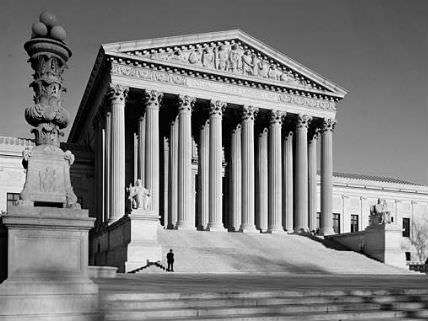How the Supreme Court Is Aiding and Abetting Occupational Licensing Abuse
Williamson v. Lee Optical of Oklahoma, Inc. should be overruled.

In 1955 the U.S. Supreme Court effectively told every federal judge in the country to uphold the vast majority of economic regulations that landed in their respective courtrooms.
"It is for the legislature, not the courts, to balance the advantages and disadvantages" of laws that regulate the economy, the Supreme Court declared in its opinion in Williamson v. Lee Optical of Oklahoma, Inc. "It is enough that there is an evil at hand for correction, and that it might be thought that the particular legislative measure was a rational way to correct it." In other words, the Court said, tip the scales in favor of lawmakers when an economic regulation is challenged in court.
The result? Even the most preposterous, pointless, and even harmful regulation stands a good chance of prevailing in federal court.
Case in point: Yesterday the U.S. Court of Appeals for the 8th Circuit repeatedly cited Lee Optical in a decision affirming the constitutionality of Missouri's ludicrous requirement that African-style hair-braiders obtain a government license before they are legally permitted to charge customers for the harmless act of braiding hair. To get such a license, would-be hair braiders must spend tens of thousands of dollars in tuition on at least 1,500 hours of cosmetology school classes. None of those mandatory classes teach or test anything about African-style hair braiding.
In 2014, the hair braiders Ndioba Niang and Tameka Stigers, represented by the lawyers at the Institute for Justice, took the Missouri Board of Cosmetology to court. Niang and Stigers argued, correctly, that the state's absurd licensing scheme serves no legitimate health or safety purpose while at the same time preventing otherwise law-abiding citizens from earning a living in a perfectly safe occupation.
But none of that mattered to the 8th Circuit. "The State 'may enact a needless, wasteful requirement in many cases,' which may 'not be in every respect logically consistent with its aims,' but still be 'constitutional,'" the 8th Circuit ruled in Niang v. Carroll, quoting extensively from Lee Optical. "There may be advantages and disadvantages to a licensing requirement, '[b]ut it is for the legislature, not the courts, to balance' them." In the opinion of the 8th Circuit, the state's licensing requirements "do not violate the Fourteenth Amendment rights of the African-style hair braiders."
From the standpoint of constitutional originalism, that is pure bunk. The 14th Amendment, as originally understood by those who drafted and ratified it, does place substantive limits on state regulatory power and does recognize the right to earn a living as one of the privileges or immunities of U.S. citizenship that "no state…shall abridge." In the words of Republican Congressman John Bingham of Ohio, the principal author of Section One of the 14th Amendment, the Privileges or Immunities Clause protects "the constitutional liberty…to work in an honest calling and contribute by your toil in some sort to the support of yourself, to the support of your fellowmen, and to be secure in the enjoyment of the fruits of your toil."
Missouri's licensing scheme for African-style hair braiders plainly violates this fundamental constitutional right and deserves to be invalidated for that reason. Unfortunately, thanks to the Supreme Court's deeply flawed ruling in Lee Optical, the 8th Circuit had a ready excuse for ignoring the 14th Amendment and rubber-stamping this nonsensical law.


Show Comments (33)